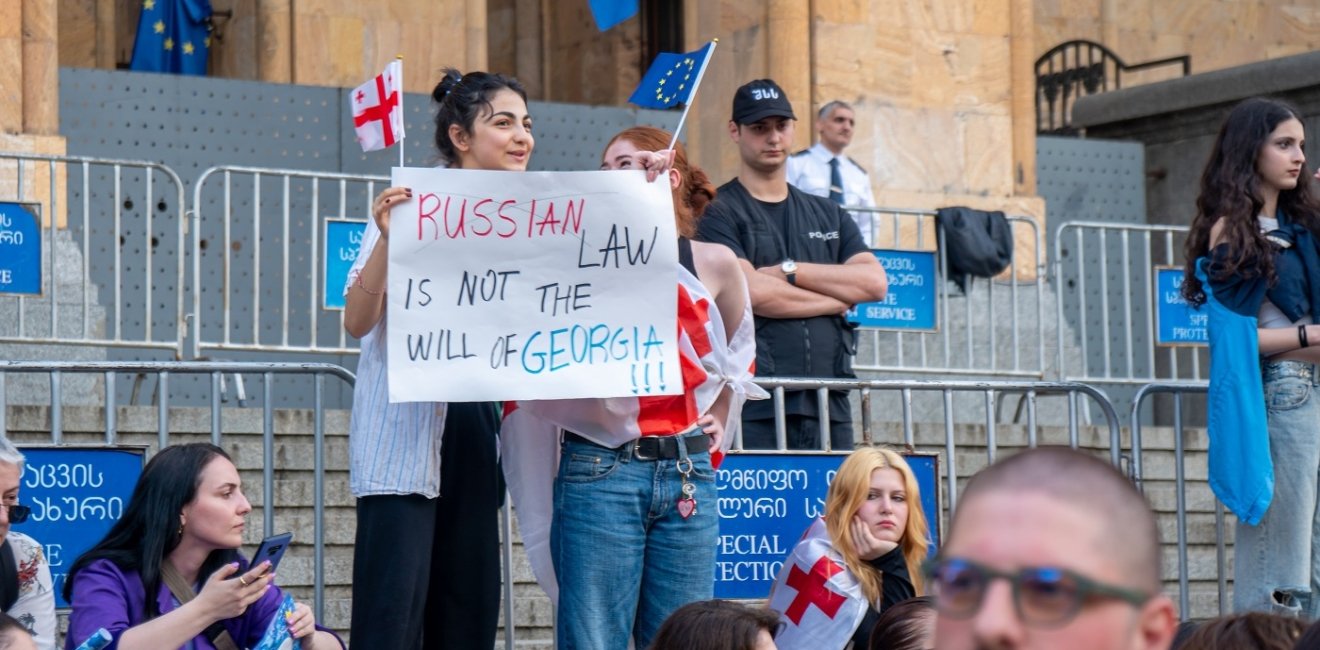
A blog of the Kennan Institute
More than 50,000 people filled the streets of Tbilisi on May 11 to protest the proposed “foreign influence” legislation, which passed the Georgian parliament in an expedited vote on Tuesday, May 14. They joined the tens of thousands of Georgians who had been protesting since early April, when parliament reintroduced the bill that would force Georgian nongovernmental organizations (NGOs) that receive more than 20 percent of their funding from abroad to disclose their financial statements and join a special registry for “foreign influence organizations.”
During the bill’s second hearing in parliament, seven Georgian lawmakers, the entirety of the opposition party’s representatives, were expelled from the proceedings. Opponents of the legislation have also been the targets of a coordinated harassment campaign. At least one opposition party member was hospitalized after being physically attacked near his home.
The bill now goes to Georgian president Salome Zourabichvili, who has stated that she will veto it. However, the ruling majority in parliament has sufficient votes to override this veto and is expected to do so.
A Russian Law for Georgia
The original version of the Georgia bill was introduced in March 2023 and withdrawn after massive public protests. The current version of the bill would require NGOs and media outlets in Georgia that receive at least 20 percent of their funding from foreign donors to register as “organizations that carry out the interests of a foreign power” and to file annual financial reports. Failing to do so would result in a fine of 25,000 GEL (US $9,400) for every month the organization was not in compliance.
President Zourabichvili called the bill “an exact duplicate” of its Russian counterpart. A broad coalition of civil society advocates have argued that the true purpose of the foreign influence bill is to stigmatize civil society organizations that are critical of Georgia’s ruling party or that play a watchdog role on such issues as government corruption and election monitoring.
As Maxim Krupksiy has explained, the primary purpose of Russia’s law is not transparency but stigmatization, and the foreign agents law is a convenient model for governments that want to replicate its chilling effect on civil society and political dissidents. Russian-style foreign agents laws have become one of the primary means of stigmatization against NGOs in Europe and beyond: Hungary, Kazakhstan, Kyrgyzstan, and Slovakia are among the countries that have already adopted foreign agents legislation, and a similar bill is also under consideration in Republika Srpska.
Challenges to Georgian Civil Society
Civil society organizations, a term that includes NGOs and other community-based groups, have been described by U.S. senators on both sides of the aisle as “the lifeblood of Georgian civil society” and play a crucial role in sustaining democracy through policy advocacy and government monitoring. A 2021 CRRC-Georgia survey of Georgian CSOs found that these organizations “are an essential pillar for sustainable and democratic development” and that many are “dedicated to youth policy and the issues of civil society development.” (The Caucasus Research Resource Center-Georgia is an NGO that collects and analyzes “policy-relevant data on social, economic and political trends in Georgia.”)
The main challenge to the operation of CSOs in Georgia is the lack of sustainable and diverse funding. As a result, these organizations have come to rely on international donors. “Some 95% of funding for CSOs comes from international donors or development agencies, and NGOs outside the capital sometimes last for only a project or two,” according to a 2020 report from Asian Development Bank. Reporters Without Borders has found that independent print and online media in Georgia are similarly dependent on foreign funding as a result of advertising laws that primarily benefit state-owned outlets.
Georgian NGO funding is already subject to relevant customs, foreign exchange, money laundering, and election financing laws, and their financial records are already made available to the government through existing regulations. The proposed bill would not achieve greater transparency of foreign funding in Georgia but would create significant barriers for independent media and civil society.
Reporters Without Borders has also observed a sharp decline in press freedom in Georgia, pointing out the government’s intent to exert control over independent media organizations through “censorship, raids, smear campaigns and intimidation.”
In recent remarks at a rally in Tbilisi, Bidzina Ivanishvili, the billionaire founder and honorary chairman of the Georgian Dream party who previously served as Georgia’s prime minister in 2012–2013, forthrightly said that the Georgian Dream party timed the reintroduction of its anti-NGO legislation to occur before Georgia’s October elections to divert the opposition’s energy from campaigning and political advocacy. “By bringing the laws to the table now, we are forcing them to expend the energy they were planning to use during the elections. Now, they are spending it uselessly in the streets,” Ivanishvili said in remarks reported by Caucasus Watch.
New Doubts over European Integration
Passing the foreign agents bill would effectively prevent Georgia from moving forward on its EU path. This would be a severe blow to Georgia’s EU aspirations, especially as EU membership enjoys widespread support among the population, and the crowds of people gathering in Tbilisi to protest the proposed bill prove this point. Integrating Georgia into the EU is also in the geopolitical interest of the EU.
The EU will need to strike a balance between being tough on the government and supporting Georgia’s civil society, especially in the run-up to the October parliamentary elections. More broadly, the EU also needs to find ways to recognize and tackle Russia’s efforts to undermine the credibility of the enlargement process not only in Georgia but in all aspiring member states.
Joining the EU means, among other things, subscribing to the norms and values enshrined in Article 2 of the Treaty of the European Union. Georgia applied for EU membership along with Moldova in March 2022 and received candidate status in December 2023. To begin the next stage—opening accession negotiations—Georgia needs to fulfill the nine steps set forth by the European Commission. These include fighting disinformation, ensuring fair and free elections, completing an effective judicial reform, and addressing the political polarization that is hindering progress in reforms. Only then can the European Commission issue a recommendation to the European Council to open accession negotiations. As a result of the current situation, no possible dates for such a recommendation to be issued have been discussed.
What’s Next?
Georgian NGOs and media outlets are preparing for the eventuality of the foreign influence bill becoming law. Former Georgian minister of defense and head of the NGO Civic Initiative for Democratic and Euro-Atlantic Choice (Civic IDEA) Tinatin Khidasheli says there are various legal strategies that these organizations can pursue in order to continue their work in Georgia. Still, Khidasheli cautions that their fight is not over—the Georgian Dream government will likely follow the Russian example and add future amendments to the foreign influence law to broaden its reach.
With the bill’s adoption almost certain, Khidasheli says now is the time for the international supporters of Georgia’s democratic society to move beyond words and impose consequences, including financial sanctions, in response to the foreign influence legislation. “I'm not even sure if those actions will stop them, but at least it will make them think twice before they push that button,” she said.
Spreading Fear, Preparing for Violence
Georgia Dream officials are also drawing invidious comparisons between Georgians’ protests against the foreign influence bill and Ukraine’s 2014 Maidan Revolution, the pro-democratic protest movement that eventually ousted then president Viktor Yanukovych. A Russian-style foreign agents bill was one of several policies enacted by the Yanukovych government in early 2014 that contributed to protests in support of Ukraine’s path toward European integration. But the Georgian government touts another aspect of the Maidan, useful for terrifying its citizens.
Khidasheli says that the comparison and its twisted logic carry an implicit threat of violence, as 108 Ukrainian protestors were killed by police during the events of the Maidan. “There was the Rose Revolution long before Maidan here,” observes Khidasheli. “But still, they are constantly talking about Maidan as being a scenario, which speaks to something else, because people died at Maidan. Nobody died during the Rose Revolution. All the Georgians on the streets are talking about the Rose Revolution. All the government talks about is Maidan, which also shows the difference in readiness: that we are ready for the Rose Revolution. Peaceful, absolutely peaceful revolution. And all they are ready for is Maidan.”
The opinions expressed in this article are those solely of the authors and do not reflect the views of the Kennan Institute.
Authors



Kennan Institute
The Kennan Institute is the premier US center for advanced research on Eurasia and the oldest and largest regional program at the Woodrow Wilson International Center for Scholars. The Kennan Institute is committed to improving American understanding of Russia, Ukraine, Central Asia, the South Caucasus, and the surrounding region through research and exchange. Read more


Global Europe Program
The Global Europe Program is focused on Europe’s capabilities, and how it engages on critical global issues. We investigate European approaches to critical global issues. We examine Europe’s relations with Russia and Eurasia, China and the Indo-Pacific, the Middle East and Africa. Our initiatives include “Ukraine in Europe”—an examination of what it will take to make Ukraine’s European future a reality. But we also examine the role of NATO, the European Union and the OSCE, Europe’s energy security, transatlantic trade disputes, and challenges to democracy. The Global Europe Program’s staff, scholars-in-residence, and Global Fellows participate in seminars, policy study groups, and international conferences to provide analytical recommendations to policy makers and the media. Read more

Explore More in The Russia File
Browse The Russia File
Chechnya as a Model of Modern Russia

Russia’s Indigenous Communities and the War in Ukraine

Gas and Power in a Changing US–Russia Relationship

